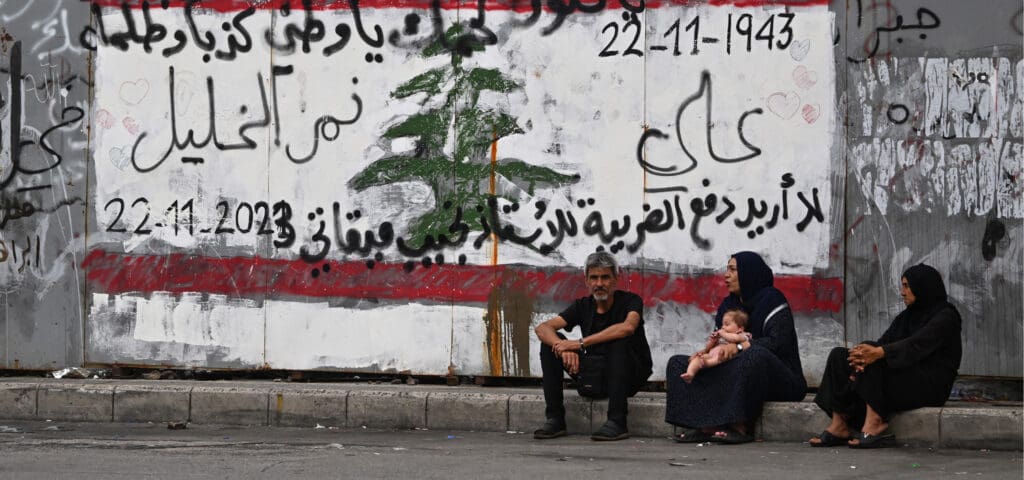A major humanitarian crisis is unfolding in Lebanon. Israel’s attacks have exacted a heavy toll with over 2,000 people killed and 9,000 wounded.
The last two weeks have wreaked severe damage on core infrastructure, public utilities, water, sanitation, power and roads. The country’s health system has also been degraded.
Much of Beirut’s Dahiyeh and South Lebanon stands in ruins. More than 1.2 million people —roughly 20 percent of the population—have been forcibly displaced in a country that is nowhere near equipped to handle a major humanitarian crisis.
The state already bears the burden of hosting the largest number of refugees per capita globally. These humanitarian, logistical and operational challenges are compounded by a near-total absence of financial resources.
A Country in Polycrisis
Today’s destruction only adds to Lebanon’s existing misery and socio-economic-political-environmental polycrisis. This month marks five years since the onset of Lebanon’s financial crisis—the deepest in global financial history.
Lebanon has also suffered the absence of a head of state for two years. This ongoing lack of a functioning unified government has bred inaction.
The banking sector’s collapse wiped out lifetime savings for most Lebanese. Lebanon’s failure to undertake structural reforms and restructure the banking system and the public sector, combined with the absence of a social safety net, has created severe socio-economic problems. Almost half the population lives below the poverty line.
The country’s catalogue of extreme challenges is long. Lebanon has already battled a sharp and disorderly devaluation of the national currency, hyperinflation, a collapse in public finances, a massive brain drain and a collapse of GDP from $54.9 billion in 2018 to $17.9 billion in 2023 and falling further in 2024.
The war will only exacerbate this crisis. We are witnessing increased population displacement, alongside lower consumption, a collapse of business activity and decimated tourism.
War could result in an interruption of schooling, which only adds to the long-term harmful effects. Meanwhile, remittances could be interrupted. These remittances are increasingly in cash and are thought to represent around 30 percent of GDP.
Should the conflict deepen and extend for longer, Lebanon’s GDP could contract by up to 25 percent, with a sharp decline in foreign trade and wider budget deficits, along with massive emigration.
Inflation is likely to accelerate and the already-battered Lebanese pound is likely to become unsustainable, swelling the U.S. dollar-based cash economy.
In the 12 months of the Israel-Hamas conflict, more than 80 percent of civilian infrastructure and more than 70 percent of civilian homes have been destroyed or severely damaged in that territory.
A Gaza-style scenario in Lebanon which sees destruction of civilian infrastructure would impose an immense reconstruction effort and cost on a country that has neither the resources nor the ability to reconstruct.
The war in 2006 saw reconstruction costs exceed $10 billion. The promised $4.4 billion in international funding under the 2002 Paris II conference was only partial: the precondition rollout of structural reforms was not undertaken.
What Should Lebanon Prioritize?
First, humanitarian aid needs to be fast tracked. The UN and the caretaker government have launched a Flash Appeal for $425 million. The GCC has already offered support and multilateral humanitarian aid has started flowing.
The needs of the displaced must be addressed, made more urgent by approaching winter. Food, shelter, medical protection and schooling must be prioritized to avoid long-term scarring effects.
Second, international access through ports, airports and international roads to Syria and the hinterland needs to be maintained.
In the 2006 war, Israel bombed the runways at Beirut airport, forcing a shutdown until the 34-day conflict ended. This should not be repeated; there have been reports of multiple explosions near the airport. Road access is critical to ensure trade and mobility, including movement of displaced persons to safer areas.
Third, Lebanon must urgently elect a new president and form a national emergency government. This new government must be capable of building unity and generating the domestic and international confidence needed to address the devastation, reach a ceasefire and plan reconstruction.
Given the growing scale of destruction, the cost of rebuilding the nation is likely to exceed $25 billion.
This article was originally published on Arabian Gulf Business Insight.


